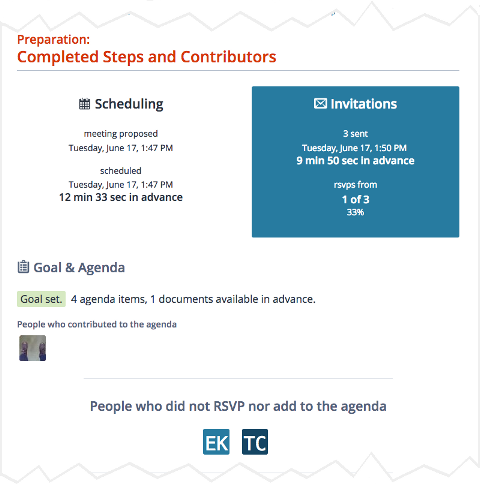By failing to prepare, you are preparing to fail.
Benjamin Franklin
To have more efficient meetings with meaningful results, the group must prepare in advance. Exactly how much preparation a meeting needs depends on many factors; the importance of the discussion, number of topics and participants, the complexity of the issue to be discussed, and how well the group knows each other all change the amount of time you should devote to preparation.
For example, at Lucid Meetings we typically spend 5 to 15 minutes each preparing for our bi-weekly team meetings. We use a standardized agenda and the meetings run from 30 to 45 minutes. Even though these meetings are short and informal, it's always obvious who prepared and who did not.
By contrast, when facilitating a half-day discovery meeting with a client, we'll typically spend 3 to 4 days preparing, and ask the client to also come prepared with specific information.
The preparation report can help facilitators better prepare before a meeting, and can be analyzed after a meeting to see how preparation may have impacted the meeting result.
Preparation Report Content

The preparation section of the meeting report
Note: You will not see any preparation information for "Meet Now" meetings. Because there isn't any.
Scheduling Information
In this section, you'll see when the meeting was proposed and when the meeting date was scheduled, or set. If the meeting times have been proposed but no time set, facilitators will see a button to set the date and time.
Invitations
Have all the invitations been sent? If so, how far in advance of the meeting did they go out? How many people RSVPd?
This section shows information about any email invitations sent. Before the meeting, facilitators will see buttons to send any invitations that still need to go out.
Aim to schedule meetings and send invitations at least 24 hours in advance. Even casual meetings run better when people have advance notice.
Goal and Agenda
The meeting goal tells everyone WHY they're meeting, and ideally, what the expected result will be - critical information for people trying to prepare. Facilitators will see a link to add a meeting goal if missing.
You'll also see information about how much content was prepared in advance and anyone who contributed to that content.
People who have not RSVPd nor added to the agenda
Here you'll see a list of anyone on the invitation list that hasn't interacted with the online meeting.
If these people haven't yet received an invitation, the facilitator will see a button to send them one.
